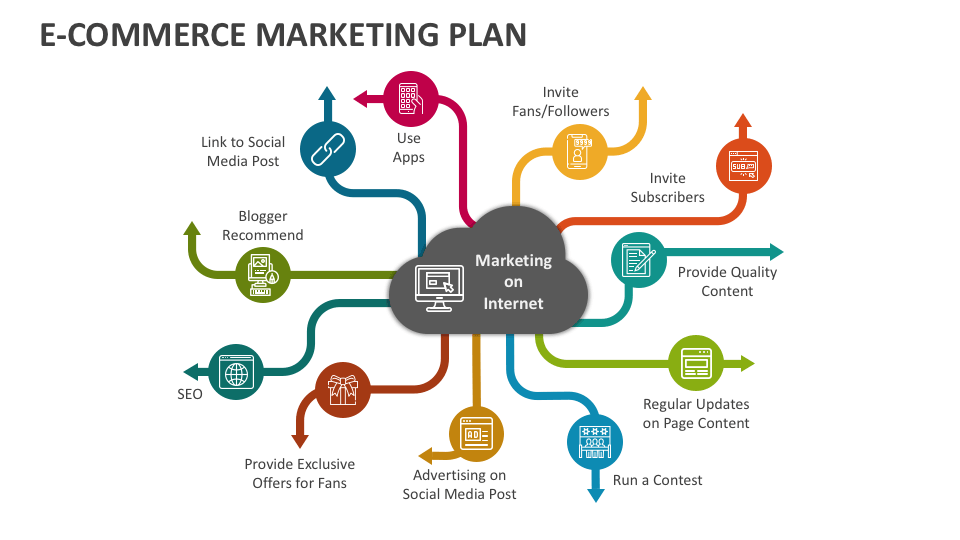E-Commerce Marketing: A Strategic Approach to Business Growth in 2025
As we move further into the digital age, e-commerce has become one of the most powerful tools for businesses to expand their reach, increase their sales, and improve customer engagement. E-commerce marketing is at the heart of this transformation, offering businesses the opportunity to tap into global markets, attract targeted audiences, and convert visitors into loyal customers. With online shopping continuing to rise, particularly in the aftermath of the COVID-19 pandemic, e-commerce marketing is more essential than ever.
In 2025, e-commerce marketing will continue to evolve, offering businesses new ways to connect with their customers, enhance user experience, and ultimately drive business growth. This article explores how e-commerce marketing plays a crucial role in achieving business objectives, the benefits it offers, and strategies that businesses can adopt to stay competitive in the rapidly changing digital marketplace.

What is E-Commerce Marketing?
E-commerce marketing is the use of digital strategies to drive traffic, increase sales, and enhance the overall customer experience in online retail businesses. It encompasses a wide range of marketing activities aimed at promoting products or services through digital channels. The core objective of e-commerce marketing is to attract potential customers, convert them into buyers, and retain them to encourage repeat purchases.
The tactics used in e-commerce marketing are diverse and include search engine optimization (SEO), paid search advertising (PPC), social media marketing, email marketing, content marketing, influencer marketing, and retargeting ads. Each of these strategies works together to create a seamless marketing funnel that nurtures leads and moves them toward a purchase.
With the growing competition in the online retail space, businesses that leverage e-commerce marketing effectively are more likely to see higher engagement rates, increased sales, and sustained business growth.

Why E-Commerce Marketing is Crucial for Business Growth
1. Broader Audience Reach
One of the most significant advantages of e-commerce marketing is the ability to reach a global audience. Unlike traditional retail businesses, which are often limited by geography, e-commerce allows companies to sell products and services to customers across the world. Through e-commerce marketing, businesses can drive targeted traffic to their online stores from various regions, broadening their customer base and increasing sales opportunities.
E-commerce marketing enables businesses to run campaigns that cater to specific geographic locations, demographics, and interests, thus ensuring that their marketing efforts are reaching the right audience. This expands market reach and ensures that businesses can grow without the limitations imposed by physical locations.
By utilizing search engine optimization (SEO), social media marketing, and paid advertising, e-commerce businesses can reach customers they might never have been able to connect with otherwise, ensuring that they can compete on a global scale.
2. Cost-Effective Marketing
In comparison to traditional forms of marketing like print ads, TV commercials, or billboards, e-commerce marketing offers a far more affordable and efficient way to promote products and services. E-commerce businesses can set up and run targeted advertising campaigns at a fraction of the cost of traditional advertising, offering a higher return on investment (ROI).
Paid advertising models, such as pay-per-click (PPC) or cost-per-click (CPC), allow businesses to manage their budgets more effectively. They only pay when potential customers click on their ads or interact with their content, which makes e-commerce marketing a more cost-efficient strategy. Furthermore, digital platforms like Google Ads, Facebook Ads, and Instagram Ads offer businesses the flexibility to adjust their ad spend, ensuring that they only pay for performance and can optimize their campaigns for maximum results.
This budget flexibility is particularly important for small businesses and startups, as it allows them to compete with larger companies without spending large amounts on traditional advertising.

3. Enhanced Customer Targeting and Personalization
E-commerce marketing provides businesses with the ability to target their audience with extreme precision. Digital advertising platforms like Google Ads, Facebook, and Instagram allow businesses to segment their audience based on specific criteria, such as age, gender, location, interests, behaviors, and even purchase history. This level of segmentation ensures that businesses are delivering highly relevant content and ads to the right people, significantly improving the chances of conversion.
For example, if a customer has previously purchased a particular product from an e-commerce store, the business can use retargeting ads to show them similar or complementary products. Additionally, personalized email campaigns can be sent to customers with offers based on their past behavior or interests, making them feel valued and encouraging them to make repeat purchases.
Personalization is key to creating positive customer experiences, and e-commerce marketing allows businesses to achieve this at scale, creating tailored shopping experiences that resonate with customers and drive sales.
4. Improved Conversion Rates and Sales
E-commerce marketing focuses on driving conversions and maximizing sales. The main goal of e-commerce marketing is to turn website visitors into paying customers, and there are many strategies that businesses can implement to achieve this. From optimizing landing pages to offering personalized recommendations, e-commerce marketing enhances the user experience, making it easier for customers to make purchasing decisions.
A critical aspect of e-commerce marketing is conversion rate optimization (CRO). This involves improving various elements of a website, such as product descriptions, images, user interfaces, and checkout processes, to ensure that visitors are more likely to complete a purchase. By continuously analyzing user behavior and testing different elements, businesses can improve their website’s performance and increase conversion rates.
Additionally, retargeting campaigns are particularly effective in e-commerce marketing. By targeting customers who have visited a website but abandoned their shopping carts, businesses can encourage them to return and complete their purchases. This approach can significantly increase sales and reduce cart abandonment rates.
5. Increased Customer Retention and Loyalty
While acquiring new customers is important, retaining existing customers is often more cost-effective and can lead to long-term business success. E-commerce marketing plays a critical role in building customer loyalty and encouraging repeat purchases. Strategies such as email marketing, loyalty programs, and personalized recommendations are effective at keeping customers engaged and coming back for more.
Loyalty programs, for example, allow businesses to reward customers for their continued purchases, offering discounts, exclusive products, or points for future purchases. These programs foster a sense of community and encourage customers to make repeat purchases, resulting in increased lifetime value for each customer.
Social media marketing is another excellent way to maintain customer engagement. By interacting with customers on platforms like Instagram and Facebook, businesses can build a relationship with their audience, keeping their brand top of mind and fostering a sense of connection and trust.
In 2025, e-commerce marketing will continue to focus on customer retention, with businesses investing more in strategies that enhance the customer experience and build loyalty over time.

6. Real-Time Analytics and Performance Tracking
One of the greatest advantages of e-commerce marketing is the ability to track performance and gather actionable insights in real time. Unlike traditional marketing, where tracking the effectiveness of a campaign can be challenging, digital marketing platforms provide businesses with detailed analytics on campaign performance, customer behavior, and sales trends.
Google Analytics, Facebook Ads Manager, and email marketing platforms like MailChimp offer businesses the ability to measure key metrics such as website traffic, click-through rates, conversion rates, and ROI. By analyzing this data, businesses can make informed decisions about their marketing strategies, adjusting campaigns based on what is working and what isn’t.
This data-driven approach allows businesses to optimize their marketing efforts continuously, ensuring that they are getting the best possible results from their ad spend. With real-time performance tracking, e-commerce businesses can act quickly to fix any issues or capitalize on successful campaigns, leading to improved efficiency and effectiveness in their marketing strategies.
7. Scalability and Growth Potential
E-commerce marketing offers businesses the ability to scale their operations quickly and efficiently. Once a business has established a solid marketing strategy, it can easily expand its reach and increase sales by adjusting its budget, targeting, and ad creatives. Digital platforms like Google and Facebook allow businesses to scale their campaigns by increasing their ad spend, targeting new audiences, and exploring new markets.
Additionally, e-commerce marketing offers the flexibility to test new products, services, or markets with relatively low risk. By running small-scale campaigns and gathering data, businesses can determine whether a new product or market is worth pursuing. This scalability allows businesses to grow quickly and adapt to changing market conditions, positioning them for long-term success.
Effective E-Commerce Marketing Strategies for 2025
To achieve success in e-commerce marketing, businesses must adopt a multifaceted approach that leverages various digital channels and tactics. Here are some of the most effective strategies for e-commerce marketing in 2025:
- Search Engine Optimization (SEO): Optimizing your website for search engines is critical for driving organic traffic. Ensure your website has high-quality content, optimized product pages, fast loading speeds, and mobile-friendly design to improve search rankings.
- Social Media Marketing: Use platforms like Instagram, Facebook, and Pinterest to promote products, engage with customers, and run paid ad campaigns targeting specific audience segments.
- Content Marketing: Create valuable content that educates, entertains, and informs your audience. Blogs, videos, and infographics are excellent ways to showcase your products and build trust with your customers.
- Email Marketing: Build and nurture an email list by sending personalized offers, product recommendations, and updates. Email campaigns are highly effective in driving repeat purchases and engaging customers.
- Influencer Marketing: Partner with influencers who have a strong following in your niche to promote your products and build credibility with your target audience.
- Retargeting Ads: Use retargeting ads to engage customers who have shown interest in your products but haven’t made a purchase yet. These ads can significantly improve conversion rates and reduce cart abandonment.
- Paid Advertising (PPC): Run paid search campaigns on platforms like Google Ads and social media networks to drive targeted traffic to your website and boost sales.

Conclusion
E-commerce marketing is a vital component of business growth in 2025. By utilizing a combination of SEO, social media marketing, email marketing, content marketing, and other digital strategies, businesses can increase brand visibility, attract targeted traffic, and ultimately drive conversions and sales. The ability to track performance in real-time and adapt marketing strategies based on data is one of the greatest strengths of e-commerce marketing.
As more businesses move online and the e-commerce space continues to evolve, businesses that invest in effective e-commerce marketing strategies will be better positioned to succeed. Whether you’re a small business just starting or an established brand looking to expand, e-commerce marketing provides the tools and techniques necessary to thrive in the competitive digital marketplace.
